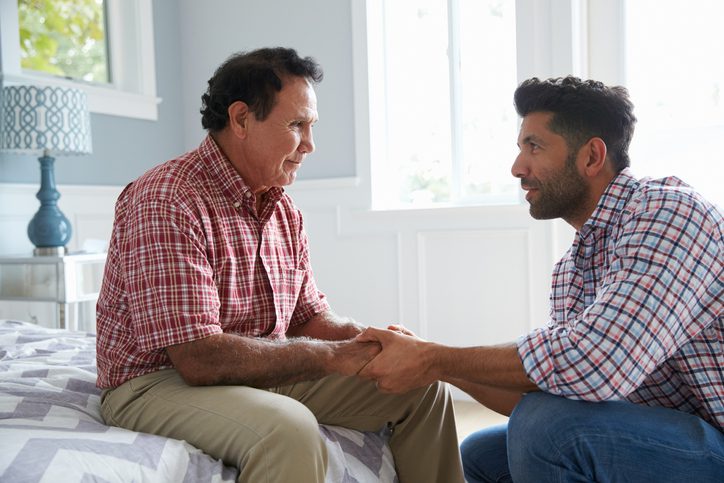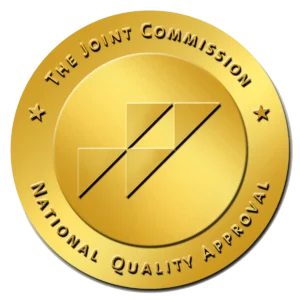Watching a parent or grandparent struggle during what is often called the “golden years” of life can be confusing and painful. While your loved one may refuse to acknowledge that they are having difficulties, it is important not to write off the concerning things you might see as just a part of aging. At The Pavilion in Williamsburg, Virginia, we regularly treat seniors with mental health diagnoses. Many of the mental health concerns facing senior citizens are highly treatable and do not need to continue decreasing your loved one’s quality of life.
Warning Signs for Senior Mental Illness
It can be easy to miss or disregard signs of mental illness in the elderly, but it is important to take note if you witness any of the following:
-
- Social withdrawal – they were active in church, never missed their weekly card game, and regularly dined out with friends, but now they just sit at home.
- Decreased attention to personal appearance/hygiene – the person who ironed every article of clothing now walks out in wrinkled clothes; their hair was always perfectly coiffed, but now it doesn’t look combed; they bathed daily, but now you notice body odor.
- Changes in appetite – they might be skipping meals and losing weight or frequently binging and needing to buy new clothes. They may have been someone who paid close attention to their nutrition before, but now they are only eating junk food.
- Depressed mood – a lot of people equate depression with sadness, but it can also be:
- Changes in sleep patterns, lower energy level
- Irritability
- Aggressiveness
- Worry
- Uncharacteristic negativity
- Increased drinking or misuse of prescription or illegal drugs – someone who used to drink a beer or two after work once in a while might suddenly be getting drunk every day; someone who was always careful to follow medical advice has started overusing their prescribed meds or they are seeking out illegal drugs.
- Memory issues – though it is normal for older adults to have some issues with memory, if the person is persistently misplacing things, does not recognize someone they know well, or asks for the same information repeatedly, that is cause for concern.
- Seeing or hearing things no one else is experiencing and believing things that are not true – hallucinations and delusions can be related to several different mental health conditions, and anyone who experiences these needs to see a doctor right away.
Risk Factors for Seniors
Far from being “golden,” old age can be difficult and painful. Elderly people face many struggles that increase their risk for mental health concerns. These include:
- Medical issues
- Sleep issues
- Loneliness
- Grief from loss of loved ones
- Lack of physical activity
- Being devalued by societal ageism
Why Can’t Seniors See The Issue?
If you have seen the signs of mental health issues and tried to talk to your aging loved one, but they continue to insist that nothing is wrong, understand that there may be numerous reasons for this denial:
-
- They assume that this is just how things are for older people – unfortunately, a lot of older adults and medical professionals share the opinion that it is normal for seniors to struggle with depression. This leads to underreporting, underdiagnosis, and untreated mental illness.
- They are worried about the cost of mental health treatment – mental health treatment can be very expensive, and getting insurance companies to pay can be a lot of work. At Pavilion, we work with insurance companies to manage hassles and costs.
- They have internalized decades of societal stigma about mental illness – men are particularly likely to believe they cannot reach out for help when they are experiencing difficulties. This has become a fatal problem for many seniors, as this is the age group with the highest rate of suicide.
- They genuinely don’t see the problem – for certain mental health conditions, lack of insight into their mental health is a symptom of the diagnosis. They may be incapable of seeing their issues, no matter how severe they are.
Suicide Risk among Seniors
Because older adults have a higher rate of suicides, and the baby boomer generation, which is now entering older adulthood, has always had a higher rate of suicides than other cohorts at similar ages, demographers are especially concerned for the well-being of senior citizens at this time. If your loved one starts to show the following indications that they could be considering suicide, you should be take action:
- Showing the warning signs for mental illness listed previously
- Talking about wanting to die or kill themselves
- Looking for a way to end their life (stockpiling pills, trying to access a firearm and ammunition, etc.)
- Stating that they are a burden on other people
- Talking about wanting to get revenge or seeming full of rage
- Saying that “nothing matters” or “nothing is going to change” no matter what they do.
Pavilion’s senior adult program specializes in providing short-term crisis stabilization for adults over age 55. We can help your loved one adjust to their “new normal” and recover from the struggles they have been facing.






